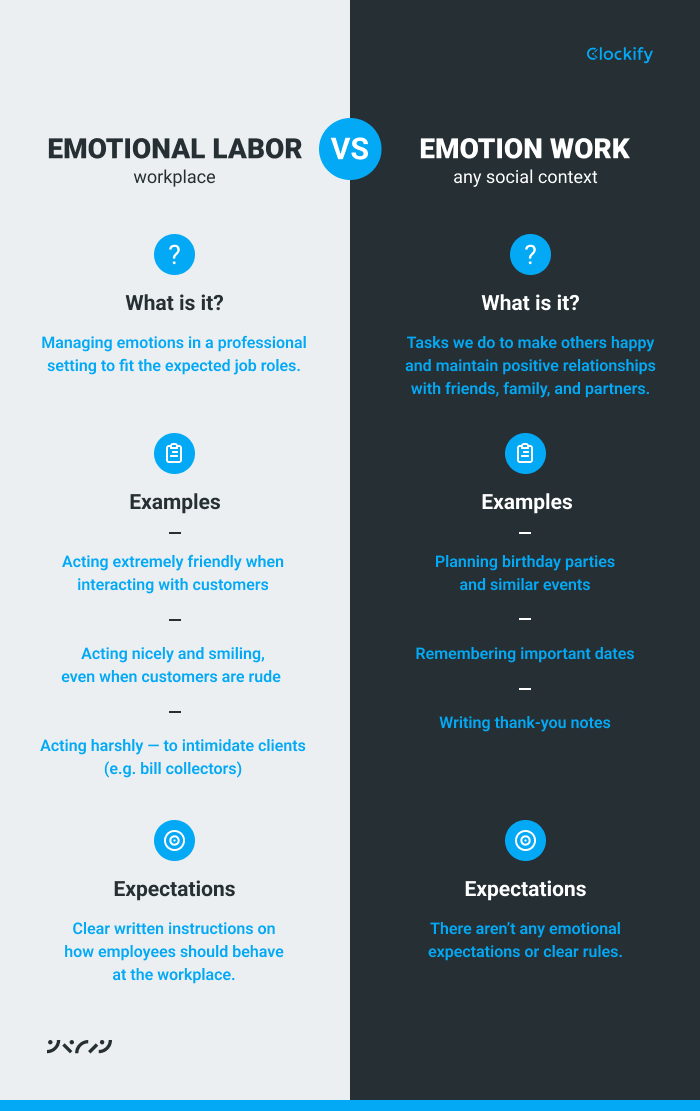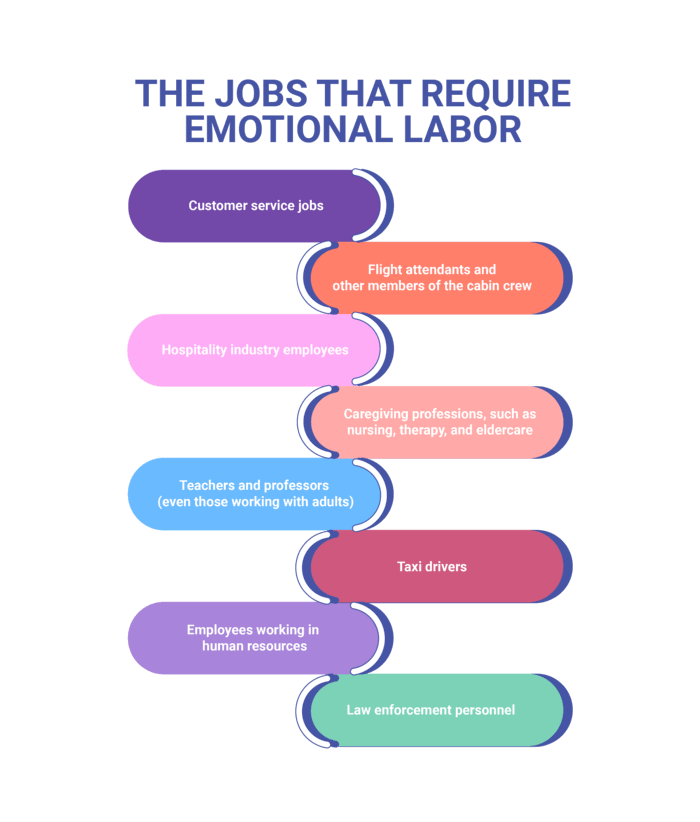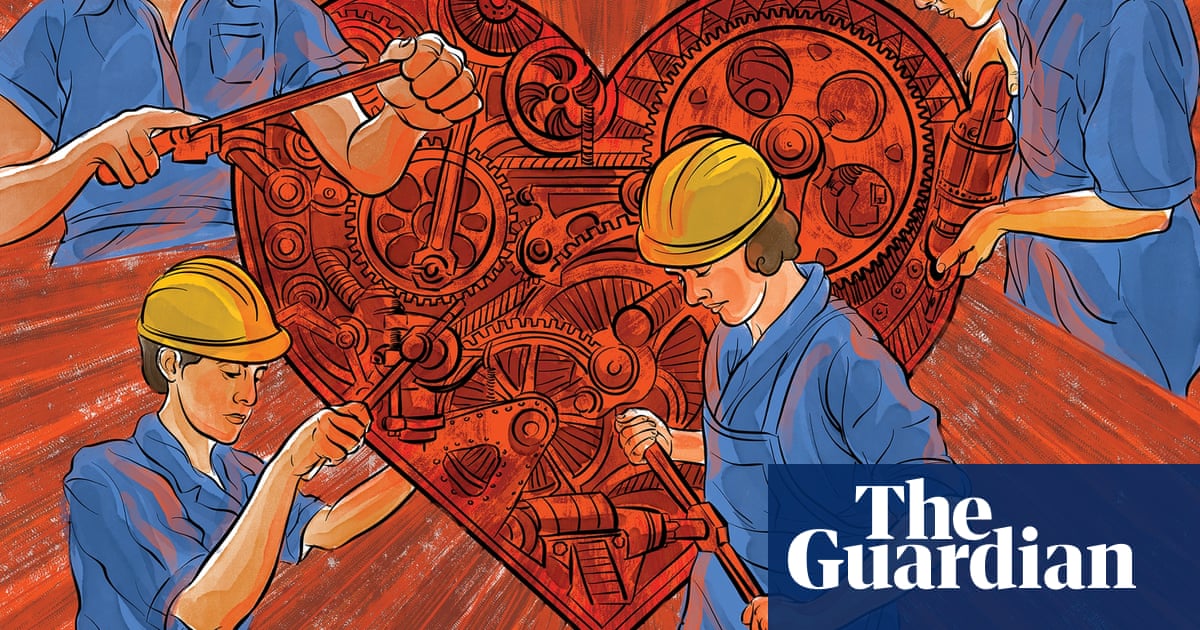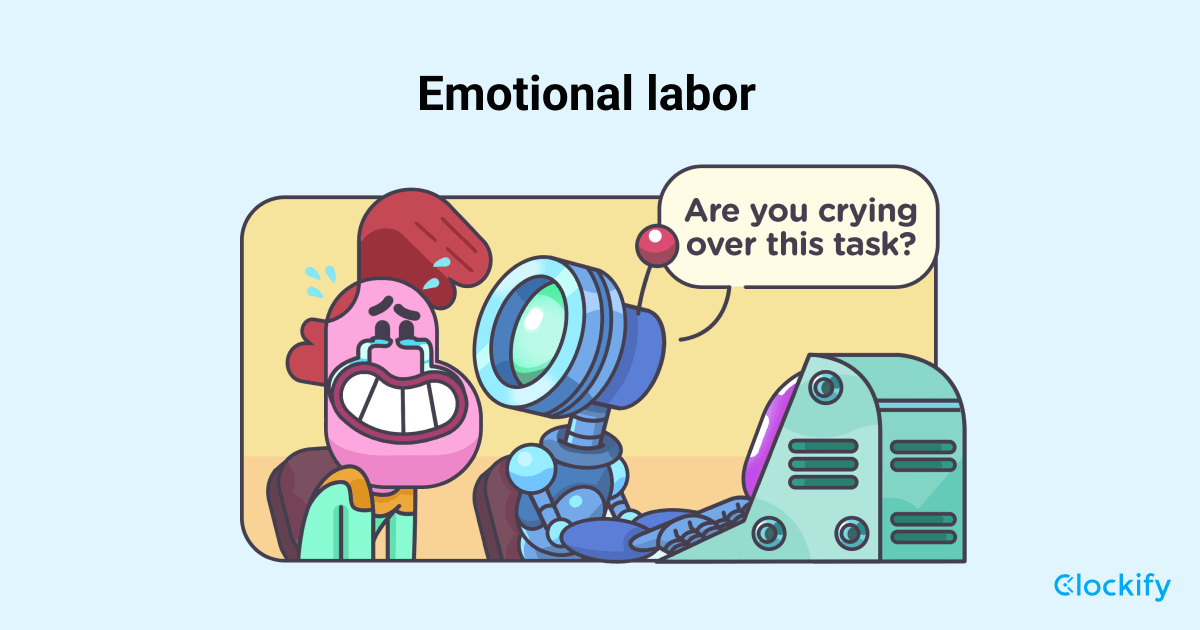Mastering Emotional Labor: Thriving at Work in 2024

In an ever-changing and fast-paced work environment, mastering emotional labor is becoming more critical than ever before.
With companies prioritizing empathy and connection, it is essential to understand how to manage emotions in the workplace effectively.
This article will provide practical tips for thriving at work by mastering emotional labor in 2024.
Quick Summary
- Emotional labor is real: It refers to the effort required to manage one's emotions to meet the expectations of others.
- It's not just women: Men also experience emotional labor in the workplace, but it's often overlooked or dismissed.
- It can lead to burnout: Constantly managing emotions can be exhausting and lead to burnout, affecting both mental and physical health.
- Employers have a responsibility: Employers should recognize and address emotional labor in the workplace to create a healthier work environment.
- It's important to set boundaries: It's okay to say no and set boundaries to protect your own emotional well-being.
Recognizing Emotional Labor In The Workplace

Recognizing and Addressing Emotional Labor in the Workplace
Emotional labor is the effort employees put into managing their emotions to meet organizational goals,customer satisfaction, and social expectations.
This may involve regulating one's own feelings or faking emotional expressions for clients.
Recognizing emotional labor in the workplace is crucial because it impacts employee well-being
Visible signs of emotional labor include forced smiles, strained facial expressions (e.g., raised eyebrows), abrupt tone shifts between customers with conflicting needs, or being expected to be friendly regardless of how you feel inside.
Paying attention enhances self-awareness and helps managers build better teams by identifying staff experiencing stress from excessive demands.
“Emotional labor is like a muscle that can get exhausted with overuse.”
How to Recognize and Address Emotional Labor
Analogy To Help You Understand
Emotional labor in the workplace is like being a professional athlete. Just as athletes train their bodies to perform at their best, employees are expected to train their emotions to perform at their best. Both athletes and employees are under constant pressure to perform, and any slip-up can have serious consequences. Just as athletes have coaches to help them manage their physical and mental health, employees need support from their managers and colleagues to manage their emotional well-being. And just as athletes are expected to leave their personal problems at the door when they step onto the field, employees are often expected to leave their emotions at home when they come to work. But just as athletes can't perform at their best if they're not taking care of their bodies and minds, employees can't perform at their best if they're not taking care of their emotional well-being. It's time for employers to recognize the importance of emotional labor in the workplace and provide the support and resources necessary for their employees to perform at their best.Challenging Stereotypes Of Gender And Emotional Expression

Challenging Gender Stereotypes in Emotional Labor
Gender stereotypes heavily influence how we express and regulate emotions at work, particularly in emotional labor.
Women are expected to be nurturing and supportive while men are seen as rational leaders who don't let feelings interfere with decisions.
In 2024, it's crucial to challenge these expectations by creating an environment where all employees can bring their authentic selves without fear of judgment or backlash for not conforming to traditional gender roles.
Shaking Up Outdated Ideas
To master emotional labor, organizations must shake up outdated ideas about masculinity and femininity at work.
This will lead to more inclusive teams that leverage everyone's unique strengths instead of relying on stereotypical traits associated with a particular gender role - such as the office mom archetype for women.
Embracing Authenticity Over Conformity
By embracing authenticity over conformity, companies can create a culture that values diversity rather than perpetuating harmful biases based on gender norms.
Ultimately, this leads towards building stronger relationships between colleagues which is essential when working together effectively toward common goals regardless of one’s sex or identity expression.
“It's time to challenge gender stereotypes in emotional labor and create a workplace where everyone can bring their authentic selves without fear of judgment or backlash.”
Challenging gender stereotypes in emotional labor is essential for creating a more inclusive workplace
By shaking up outdated ideas about masculinity and femininity, companies can create a culture that values diversity and authenticity over conformity.
This leads to stronger relationships between colleagues and more effective teamwork towards common goals.
“Let's embrace authenticity and challenge gender norms to create a workplace that values everyone's unique strengths.”
It's time to challenge gender stereotypes in emotional labor and create a workplace where everyone can bring their authentic selves without fear of judgment or backlash.
Some Interesting Opinions
1. Emotional labor is a form of exploitation that disproportionately affects women.
According to a study by the American Sociological Association, women are more likely to be employed in jobs that require emotional labor, such as customer service and healthcare. This often leads to burnout and lower pay compared to male-dominated fields.2. Emotional labor should be recognized as a legitimate workplace hazard.
A study by the University of Arizona found that emotional labor can lead to physical and mental health problems, including cardiovascular disease and depression. Employers should be held accountable for protecting their employees from these risks.3. The expectation of emotional labor perpetuates harmful gender stereotypes.
A study by the University of Michigan found that women who display emotions in the workplace are often seen as less competent and less deserving of leadership positions. This reinforces the idea that women are inherently emotional and unfit for certain roles.4. Emotional labor is often used as a tool of oppression in service industries.
A study by the University of California, Berkeley found that workers in the service industry are often expected to perform emotional labor for customers who are abusive or discriminatory. This can lead to a hostile work environment and further marginalization of already vulnerable workers.5. The solution to emotional labor is not to simply "toughen up."
A study by the University of Exeter found that emotional suppression can lead to negative health outcomes, including increased risk of heart disease and cancer. Employers should focus on creating a supportive work environment that values emotional intelligence and provides resources for managing stress and burnout.Setting Boundaries For Personal Well Being

Setting Boundaries for Personal Well-being in 2024
Thriving at work requires setting boundaries for personal well-being.
Boundaries define what we accept from others and our limits on time, energy, and emotional resources.
How to Set Effective Boundaries
- Clarify priorities during a typical day or week
- Focus on high-priority tasks and quality time with inspiring colleagues
- Say no when necessary to avoid draining activities
- Schedule regular breaks throughout the day to recharge
- Create a specific schedule for checking emails instead of constantly responding as they come in
Let go of perfectionism by accepting mistakes as opportunities to learn rather than failures that harm self-worth or productivity.
Remember: Setting healthy boundaries is not selfish but essential for long-term success both personally and professionally!
Building Supportive Networks At Work

Building Supportive Networks in the Modern Workplace
Supportive networks are crucial for thriving in the modern workplace.
They not only improve job satisfaction but also mental wellbeing, acting as a buffer against stress and burnout.
Here are some ways to build supportive networks:
- Join affinity groups or committees within your organization to connect with like-minded individuals who share similar interests or backgrounds
- Participate in team-building activities such as volunteering or attending conferences together to strengthen relationships among coworkers
- Attend company events outside of work hours to meet and connect with colleagues in a more relaxed setting
- Seek mentorship from more experienced colleagues to gain valuable insights and guidance
- Offer support during challenging times to show your colleagues that you care
- Use technology tools like Slack channels or virtual chat rooms to stay connected with remote team members
- Take initiative by planning social events for coworkers to foster a sense of community and belonging
Remember, building supportive networks is not only beneficial for your career but also for your mental health and overall wellbeing.
By taking the time to connect with your colleagues and build meaningful relationships, you can create a more positive and fulfilling work experience
So, don't be afraid to step out of your comfort zone and start building your supportive network today!
My Experience: The Real Problems
1. Emotional labor is a form of exploitation that disproportionately affects women and minorities.
According to a study by the National Women's Law Center, women are more likely to be in jobs that require emotional labor, such as customer service and healthcare. This labor is often undervalued and underpaid.2. Emotional labor is a symptom of a toxic work culture that prioritizes profit over employee well-being.
A survey by the American Psychological Association found that 75% of American workers believe their employers prioritize profits over employee well-being. This leads to high levels of stress and burnout, which are often exacerbated by emotional labor.3. Emotional labor is often used as a tool of oppression and control in the workplace.
A study by the University of Toronto found that emotional labor is often used to enforce gender and racial stereotypes in the workplace. This can lead to discrimination and harassment.4. Emotional labor is not a skill that can be easily taught or learned, and should be compensated accordingly.
A study by the University of California, Berkeley found that emotional labor is not a skill that can be easily taught or learned. This means that workers who are naturally good at emotional labor are often undervalued and underpaid.5. The solution to emotional labor is not to simply "toughen up" or "leave your emotions at the door."
A study by the University of Arizona found that suppressing emotions at work can lead to negative health outcomes, such as increased stress and decreased job satisfaction. The solution is to create a work culture that values emotional intelligence and supports employees in managing their emotions.Identifying Burnout Triggers And Signs

Preventing Burnout: Identifying Triggers and Signs
Burnout can affect anyone, from entry-level employees to high-level executives.
To prevent emotional exhaustion, it's crucial to identify burnout triggers and signs.
Fortunately, early identification of these triggers and signs can significantly reduce its impact.
Signs of Burnout
Disengagement is a common indicator of burnout.
This includes feeling drained or unproductive, losing interest in work activities, or becoming cynical towards colleagues.
Physical symptoms like headaches, insomnia, digestive problems, or muscle tension may also be present.
Burnout Triggers
Poor work-life balance, unreasonable workload expectations, lack of support from coworkers/supervisors, and high-pressure environments with tight deadlines/unclear goals are other contributing factors.
Identifying Potential Triggers
Here are five quick tips for identifying potential triggers before they lead to full-blown burnout:
- Pay attention to physical changes during work
- Monitor your emotions and energy levels throughout the day
- Identify tasks that drain your energy and delegate when possible
- Set realistic goals and prioritize tasks
- Take breaks and practice self-care regularly
Remember, burnout is preventable.By identifying triggers and signs early on, you can take steps to reduce its impact and maintain a healthy work-life balance
Strategies For Managing Stressful Situations With Grace

Strategies for Handling Stress Gracefully
To handle stress gracefully, try these strategies:
- Step back and assess the situation before reacting.
Your initial response may not be the best for handling it.
Take a moment to understand what's happening so you can choose your reaction wisely.
- Find healthy ways to cope with stress like going for walks or practicing mindfulness techniques such as deep breathing exercises or meditation during breaks.
Stress is not what happens to us.
It's our response to what happens.
And response is something we can choose.
- Maureen Killoran
Here are five more tips:
- Tackle problems head-on; don't procrastinate.
- Eat well and get enough rest to take care of yourself.
- Talk through feelings with someone who listens actively.
- Set realistic goals and prioritize tasks to avoid feeling overwhelmed.
- Take breaks throughout the day to recharge and refocus.
My Personal Insights
As the founder of AtOnce, I have had my fair share of experiences with emotional labor in the workplace. One particular incident stands out in my mind. A few months ago, we had a customer who was extremely upset with our product. They had been experiencing technical difficulties and were not satisfied with the support they had received thus far. When I received the email from this customer, I could feel my anxiety levels rising. I knew that I needed to respond in a way that would not only address their concerns but also make them feel heard and valued. As I began crafting my response, I turned to AtOnce for assistance. Our AI writing tool helped me to choose the right words and tone to convey empathy and understanding. It also helped me to anticipate any follow-up questions or concerns the customer might have and address them proactively. Thanks to AtOnce, I was able to respond to the customer in a way that not only resolved their technical issues but also left them feeling satisfied with the level of support they had received. This experience taught me the importance of emotional labor in the workplace and how AI tools like AtOnce can help alleviate some of the burden. At AtOnce, we believe that emotional labor is a critical component of any successful business. By using AI tools to assist with this labor, we can create a more positive and productive work environment for everyone involved.Improving Communication With Colleagues And Superiors

Mastering Emotional Labor at Work
Effective communication skills are essential to mastering emotional labor at work.
To improve, follow these tips:
- Actively listen to colleagues and superiors without interrupting or planning your response
- Understand their perspective before thoughtfully responding
- Match your tone to the message you want to convey
- Use a friendly tone for praise and encouragement
- Encourage positive interactions while avoiding misunderstandings in building relationships
Remember, emotional labor is the effort required to manage your emotions and the emotions of others.
It's a crucial skill in the workplace, and it can be challenging to master.
However, with practice and patience, you can become an expert in managing emotional labor.
Emotional labor is the effort required to manage your emotions and the emotions of others.
When communicating with colleagues and superiors, it's essential to be mindful of your tone.
Crafting A Positive Mindset To Overcome Obstacles

Mastering Emotional Labor in 2024
Emotional labor can be tough, but with the right mindset and tools, you can overcome any obstacle.
To thrive at work in 2024,focus on what's within your control.
Craft a Positive Mindset
Recognize negative thought patterns or limiting beliefs that hold you back.
Replace them with empowering thoughts and reframe obstacles as opportunities to shift perspective and stay motivated.
Don't ignore challenges; find solutions while staying optimistic.
Creating a Positive Mental Attitude
- Practice daily gratitude
- Focus on progress over perfection
- Seek out support from colleagues or mentors who share similar values
- Take breaks throughout the day to recharge your energy levels
- Celebrate small wins along the way for motivation towards bigger goals
Remember: mastering emotional labor is an ongoing process that requires patience and persistence.By implementing these tips consistently into your routine, you'll develop resilience skills needed to succeed in today's workplace environment!
Developing resilience skills is essential to succeed in today's workplace environment.
By implementing these tips consistently into your routine, you'll be able to master emotional labor and overcome any obstacle that comes your way.
Remember to stay positive, focus on progress, seek support, take breaks, and celebrate small wins along the way.
With patience and persistence, you'll thrive at work in 2024!
Advocating For Your Own Needs At Work

Mastering Emotional Labor: Advocating for Your Needs at Work
Self-care is crucial for productivity and success in the workplace.
To achieve this, mastering emotional labor is essential.
Here are some tips to help you advocate for your own needs:
- Set clear boundaries with colleagues who ask too much
- Say no when overwhelmed
- Articulate what support you need to succeed and communicate those needs
Don't be afraid to ask questions.
Taking breaks throughout the day is also important.
Prioritize tasks based on importance and ensure open communication lines are maintained.
Remember, advocating for yourself may feel uncomfortable or awkward, but it's necessary to thrive in the workplace.
By setting boundaries and communicating your needs, you'll be able to perform well and be more productive.
Don't forget to take care of yourself!
Enhancing Empathy And Understanding In Interpersonal Relationships

Enhancing Empathy and Understanding in the Workplace
Empathy and understanding are crucial for successful emotional labor at work.
Accurately perceiving others' emotions, showing concern, and demonstrating an understanding of their experience fosters strong working relationships.
Improving Your Ability to Empathize
- Listen attentively
- Avoid assumptions - ask open-ended questions instead
- Use body language(e.g., nodding or eye contact)
- Reflect on personal biases that may affect interactions with coworkers
- Practice active listening techniques like paraphrasing what you've heard
Empathy can build a supportive work culture where everyone feels valued.
By implementing these strategies into daily communication,meaningful connections will develop while enhancing overall productivity.
Remember, empathy is a skill that can be developed and improved over time.
Encouraging Diversity, Equity, Inclusion, And Belonging At Work
Encouraging Diversity, Equity, Inclusion, and Belonging in the Workplace
Creating a positive workplace environment requires promoting diversity, equity, inclusion, and belonging.
Clear policies should be in place to ensure that everyone feels welcome, regardless of their background or identity.
“Diversity is being invited to the party.Inclusion is being asked to dance.” - Verna Myers
Employers must hire diverse individuals and provide opportunities based on merit, rather than personal relationships or biases.
Regular training sessions on cultural sensitivity and unconscious bias can foster an inclusive culture.
“Diversity is not about how we differ.Diversity is about embracing one another's uniqueness.” - Ola Joseph
How to Encourage DEIB at Work
Here are some ways to promote diversity, equity, inclusion, and belonging in the workplace:
- Create employee resource groups focused on different identities (race/ethnicity/gender/age/etc.) so they have community
- Review all hiring practices to ensure fairness in the selection process
- Provide accommodations for employees with disabilities
- Encourage open communication between management and staff about any issues related to DEIB
- Celebrate differences through events that highlight various cultures represented within the company
“Diversity: the art of thinking independently together.” - Malcolm Forbes
By implementing these strategies, companies can create a more inclusive and welcoming workplace for all employees.
Embracing Ongoing Learning Opportunities To Master Emotional Labor
Mastering Emotional Labor at Work
Continuous learning is crucial to mastering emotional labor at work.
Keeping up with the latest techniques and strategies to manage your emotions while dealing with others is essential.
Learning Opportunities
There are many learning opportunities available to help you master emotional labor:
- Attend workshops or conferences on emotional intelligence for insights from experts, tips, and networking opportunities
- Take online courses on conflict resolution for flexibility
- Find a mentor to guide you
- Join groups focused on developing emotion regulation skills
- Read books about emotional intelligence
- Attend webinars or seminars
Investing in yourself by seeking out continuous learning opportunities is essential.
Continuous learning is the minimum requirement for success in any field.
- Denis Waitley
By continuously learning, you can improve your emotional intelligence, develop better communication skills, and build stronger relationships with your colleagues.
The only way to do great work is to love what you do.
- Steve Jobs
Mastering emotional labor at work takes time and effort, but it's worth it.
Final Takeaways
As a founder of a tech startup, I've experienced my fair share of emotional labor in the workplace. It's the kind of work that often goes unnoticed, but can take a significant toll on one's mental and emotional well-being. For those who may not be familiar with the term, emotional labor refers to the work that goes into managing one's emotions and the emotions of others in the workplace. It can include everything from managing difficult customers to navigating office politics. At AtOnce, we understand the importance of emotional labor in the workplace, which is why we've developed an AI-powered customer service tool that can help alleviate some of the burden. Our tool uses natural language processing and machine learning to understand customer inquiries and provide personalized responses in real-time. By taking on some of the emotional labor involved in customer service, our tool allows employees to focus on other important tasks and reduces the risk of burnout. It also ensures that customers receive prompt and accurate responses, which can lead to increased satisfaction and loyalty. But emotional labor isn't just limited to customer service. It can also be present in team dynamics and interpersonal relationships in the workplace. That's why we're also developing an AI-powered writing tool that can help employees communicate more effectively and efficiently with one another. By taking on some of the emotional labor involved in communication, our tool can help reduce misunderstandings and conflicts, and promote a more positive and productive work environment. At AtOnce, we believe that by leveraging the power of AI, we can help alleviate some of the emotional labor involved in the workplace and create a more supportive and fulfilling work environment for everyone.Do you struggle to create engaging content that captures your audience's attention?
Are you tired of spending hours writing and editing, only to still end up with lackluster copy? Are you ready for a solution that simplifies the writing process and helps you achieve your business goals? The Solution: AtOnce AI Writing ToolAtOnce's AI writing tool is here to transform the way you create content.
Say goodbye to writer's block and hello to inspiring copy that drives conversions. With AtOnce, you can:- Generate high-quality content in minutes
- Customize your writing style for your target audience
- Maximize your SEO potential with optimized content
- Increase engagement with personalized messaging
- Improve overall writing quality with AI-powered editing
Why Choose AtOnce?
AtOnce's AI writing tool is not just another automated content generator. It's a tool designed specifically to meet your needs as a business owner, marketer, or content creator. By choosing AtOnce, you'll benefit from:- Expertly crafted copy that drives results
- Customizable writing styles to fit your brand voice
- Unbeatable speed and efficiency in content creation
- Improved SEO rankings with optimized content
- Increased overall productivity with streamlined workflows
Join the Revolution in Content Creation
Don't let boring writing hold you back from achieving your business goals.
With AtOnce's AI writing tool, you can revolutionize your content creation process and take your business to the next level. Say goodbye to writer's block and hello to high-converting copy - try AtOnce today.What is emotional labor?
Emotional labor refers to the effort required to manage one's own emotions and the emotions of others in a professional setting.
Why is emotional labor important in the workplace?
Emotional labor is important in the workplace because it can lead to better communication, improved relationships, and increased job satisfaction and productivity.
What are some strategies for mastering emotional labor?
Some strategies for mastering emotional labor include practicing self-care, setting boundaries, developing empathy, and improving communication skills.
